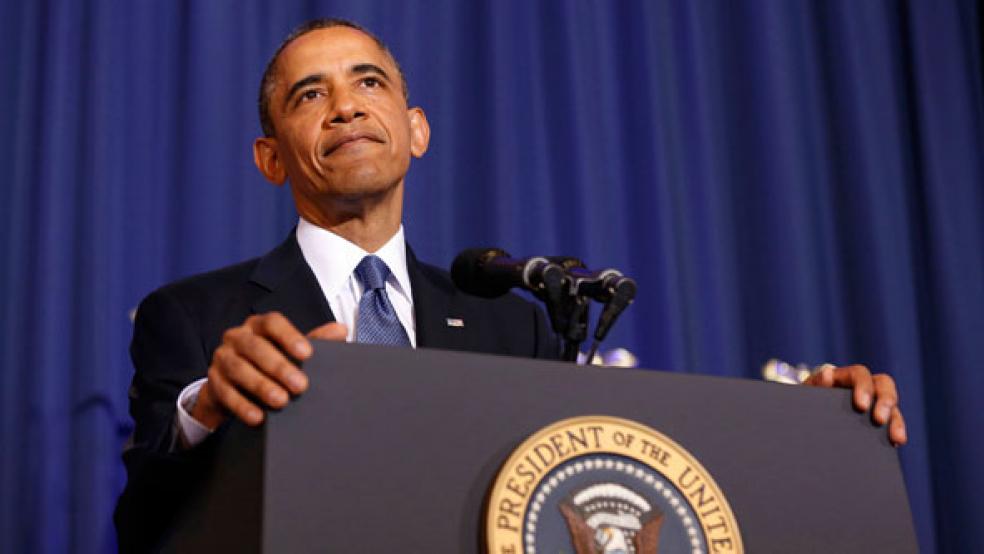Last week’s declaration of the end of the ‘war on terror’ by President Barack Obama was a direct message to the Pentagon and a war-weary American public that a decade of large wars is coming to a close. It was also a justification to the president’s liberal base for his use of questionable tactics, most notably drones.

The speech was widely praised. The New York Times said the president made clear that the war on terror was “unsustainable for a democracy and must come to an end in the not-too-distant future,” while the Washington Post lauded the president for his “intention to have the Pentagon replace the CIA in the execution of [drone] attacks.” Sen. Charles Schumer, D-NY, called the speech a “very smart pivot” in the war against extremism.
But the speech has drawn critics as well. Some Republicans blasted the president for his assertion that the war against terror is over, arguing that the struggle is perpetual. Even some traditional allies of the president, including the American Civil Liberties Union, said the president did not go far enough in restricting the use of drones.
A close examination of the speech nearly a week later poses important questions about how the Obama administration plans to change the way Americans fight, and what this means for the country. Until these questions are answered, it’s impossible to know if Obama’s speech has teeth, or was just political theater.
1. How much has drone policy really changed? Obama said drone operations are being removed from the CIA, with responsibility for such attacks now falling to the Pentagon – read NSA. He also said drone strikes would not be carried out against foreign combatants until they have undergone the same scrutiny that the strike against the radical Muslim cleric, Anwar al-Awlaki—an American citizen—was subjected to.
But in reality how much does that change? The president still has the authority to conduct the strikes. All that’s changed is the process by which the decision to strike is made. As ACLU Executive Director Anthony Romero said, "the president still claims broad authority to carry out targeted killings far from any battlefield, and there is still insufficient transparency."
2. What happens to the American economy? Obama’s speech was as much as budget justification as it was a war policy outline. The president made clear that the long-threatened drawdown was on course and the Pentagon would be forced to do more with less.
This could have an adverse impact on economic growth. Over the last decade, defense spending has accounted for such a large portion of government spending – nearly 20 percent in 2012 – that any drop-off would be felt across the wider economy. This affect has already been noticed, as experts attributed slowing GDP growth in recent quarters to defense cuts.
3. What’s the CIA’s role now? In the last decade, the CIA’s capabilities have evolved from intelligence collection to execution of mission, including drone strikes.
But the president has tried this policy before, and has failed. In 2009, he determined that the Pentagon should take the lead in conducting drone operations over Yemen. But in 2011, when the base opened, it was under the control of the CIA. Counterterrorism officials are warning that the transition from the CIA to DOD is a difficult one. Whether Obama follows through on the change remains to be seen.
4. Is Republican criticism warranted? Republicans blasted the president for declaring the terrorism war over. They contend it’s perpetual and will never be won until Islamic extremism is eradicated.
Recent events show that they might be right. People motivated by Muslim extremism carried out the Boston bombings, and the perpetrators of the London attack against a soldier also cited Islam as their motivation. So while the days of fighting an organized group like al Qaeda might be over, the battle against extremism seems far from won.
5. Will actions follow the rhetoric? At a point in last week’s speech, it felt like Obama was directly responding to criticisms from the left, including violations of civil liberties caused by drone strikes and the Guantanamo Bay prison.
Obama’s words likely comforted these critics. But the president has often shown that his actions do not match his words. He pledged to close Guantanamo years ago, and has failed to do so. He condemned the policies of George W. Bush while campaigning, yet continued to implement them as president.
Only time will tell whether Obama follows through with policies that support his ideas and changes outlined by during his speech. If he fails to do so, he’ll leave a rhetorical record that far outshines his actions as president.
Follow David Francis on Twitter @davidcfrancis. Email him here.


